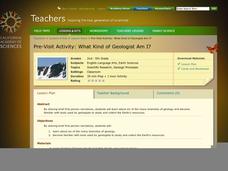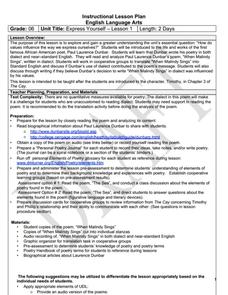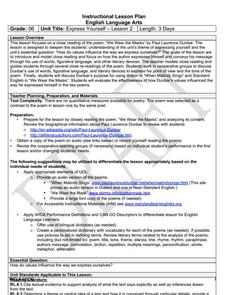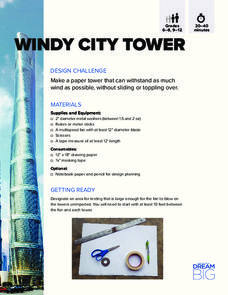Curated OER
"Tomorrow and Tomorrow and Tomorrow"
Do you want to live forever? After reading Kurt Vonnegut’s short story, “Tomorrow and Tomorrow and Tomorrow,” class groups adopt the roles of an ethics committee, product manufacturers, concerned scientists, and potential users of an...
Alabama Learning Exchange
Mirror, Mirror on the Wall: Reflections of Light
Why can we see our reflection in a window but not a brick wall? Young physicists learn the Law of Reflection and various light properties that help them answer this and other questions about reflection. Use the PowerPoint to introduce...
Friends of Fort McHenry
Cannons During the War of 1812
During the Battle of Baltimore in the War of 1812, only 25% of the bombs and rockets fired at Fort McHenry actually reached their target. Using an interactive online simulation, combine your historical study with physics and discover why...
California Academy of Science
What Kind of Geologist Am I?
Transform your class into young geologists as they learn about six different branches of geology. Using the included geology career descriptions and picture cards, learners work in small groups deciding which tools and locations fit...
Curated OER
6th Grade: Express Yourself, Lesson 1: Poem
While originally created to accompany The Cay, this poetry lesson could be used on it's own, especially if you are working on dialect. Class members conduct a close reading of "When Malindy Sings" by Paul Laurence Dunbar and listen to an...
Curated OER
6th Grade: Express Yourself, Lesson 2: Close Read
The second instructional activity of a pair about Paul Laurence Dunbar, this plan focuses in particular on his poem, "We Wear the Masks." After a short historical introduction, class members conduct a series or readings, marking up the...
Curated OER
Flicking Football Fun
Young mathematicians fold and flick their way to a deeper understanding of statistics with a fun, hands-on math unit. Over the course of four lessons, students use paper footballs to generate data as they learn how to create line...
Curated OER
Plate Tectonics: Fourth Grade Lesson Plans and Activities
The pre-lab portion of the lesson introduces emerging geologists to the various layers that make up Earth. After completing a sheet on the identification of the layers, class members simulate plate boundaries and their...
Virginia Department of Education
Weather Patterns and Seasonal Changes
Get your class outside to observe their surroundings with a lesson highlighting weather patterns and seasonal changes. First, learners take a weather walk to survey how the weather affects animals, people, plants, and trees during...
EngageNY
Finding a Rate by Dividing Two Quantities
Develop the right station to solve rate word problems. The 18th lesson in a series of 29 starts by interpreting the aspects of rates with two different quantities. Pupils use the interpretation of rates to solve problems, and groups work...
Cornell University
Making a Battery
Don't be shocked when your class has a blast making their own batteries! Science scholars examine a dry cell battery, then design and construct a wet cell battery. The activity guides them through the parts of a battery, the variables...
NOAA
Wet Maps
How do oceanographers make maps under water? Junior explorers discover the technologies and processes involved in creating bathymetric maps in part three of a five-part series designed for fifth- and sixth-grade pupils. The lesson...
NOAA
Mapping the Deep-Ocean Floor
How do you create a map of the ocean floor without getting wet? Middle school oceanographers discover the process of bathymetric mapping in the third installment in a five-part series of lessons designed for seventh and eighth graders....
NOAA
Through Robot Eyes
How do robots assist ocean explorers in collecting data and images? The final installment in a five-part series has science scholars examine underwater images collected by robots and identify the organisms shown. Groups then calculate...
Cornell University
Nano Interactions
Tiny particles can provide big learning opportunities! Middle school scientists explore the world of nanoparticles through reading, discussion, and experiment. Collaborative groups first apply nanotechnology to determine water hardness....
Royal Society of Chemistry
Mass Changes in Chemical Reactions—Microscale Chemistry
What better way is there to introduce conservation of mass than a few simple experiments? Young chemists conduct two chemical reactions, take the masses of reactants and products, then compare their results to determine differences in...
DiscoverE
Windy City Tower
Your class will be blown away when they build their own city tower structure! Engineering scholars partner up to plan, build, and test their own paper towers. As they build, they gain valuable design skills, learn about wind tunnel...
DiscoverE
Design a Folding Solar Panel
Solar energy is an amazing alternative ... but, not always particularly portable! Challenge young scientists to a folding solar panel build-off with an easy-to-execute activity. Scholars brainstorm around specific design needs, construct...
Royal Society of Chemistry
Concentration of Solutions 2
Challenging and interactive—everything you need in a resource! Chemistry scholars manipulate a series of puzzles focused on molarity. The teacher's guide provides support for implementing the lesson, as well as printable materials.
Royal Society of Chemistry
Concentration of Solutions 1
Need a fun solution to teaching ... solutions? A series of puzzles provides reinforcement to key molarity terms and calculations. Science scholars determine the concentration of several solutions before using the information to solve...
Royal Society of Chemistry
Mass Concentration of Solutions
Ready to teach your class about molar mass and solution concentration? Make time for an interactive resource that will challenge their reasoning and problem-solving skills. Science scholars calculate the molarity of several solutions...
Royal Society of Chemistry
Green Plastics—Chemistry Outreach
How do green plastics reduce waste and environmental pollution? Budding scientists create and test a variety of compounds used in green plastics during an insightful experiment. Beginning with startling statistics and ending with...
Howard Hughes Medical Institute
Tracking Genetically Modified Mosquitoes
What's that buzzing in your ear? An insightful lesson about genetically modified mosquitoes! Partnered pupils explore the creation, release, and monitoring of mosquitoes designed to reduce the mosquito population. After watching a video,...
US Institute of Peace
Taking a Step Toward Peacebuilding
What can someone do to increase the peace? Pupils take small steps toward a big peacebuilding role in the final lesson in a 15-part unit. Individuals identify their roles as a peacebuilder and create a stepping stone that reflects their...
Other popular searches
- Customary Measurement
- Math Measurement
- Liquid Measurement
- Measuring Angles
- Nonstandard Measurement
- Capacity Measurement
- Standard Measurement
- Linear Measurement
- Angle Measurement
- Measurement Length
- Geometry Measurement
- Units Measurement

























